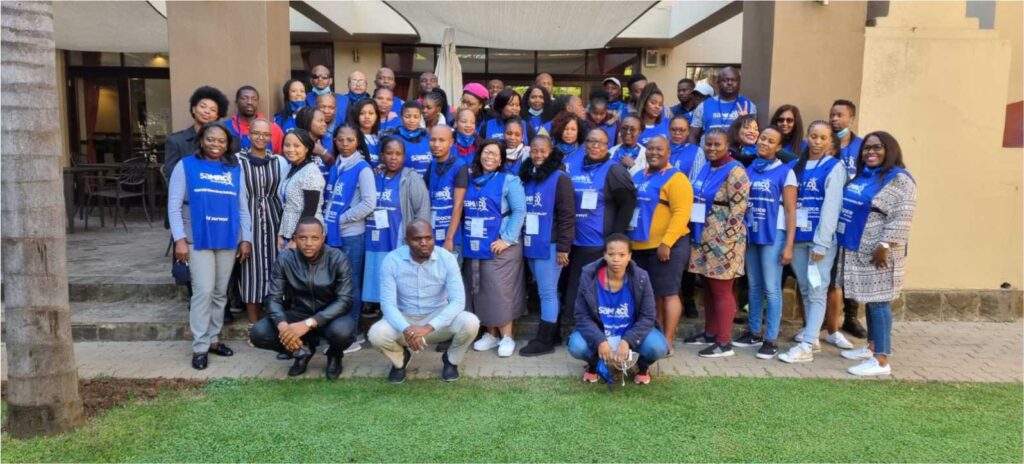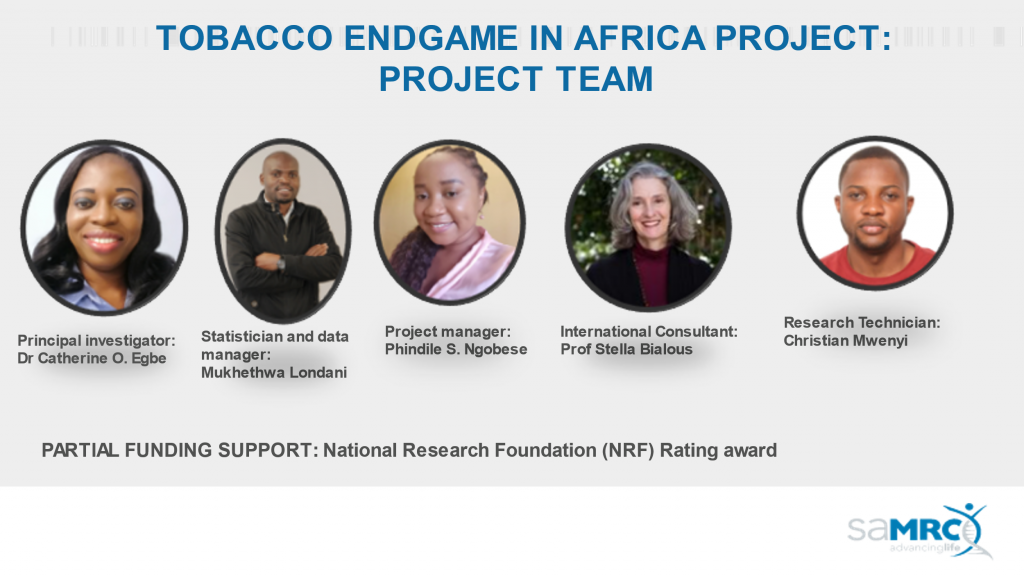
Current Research Projects
Coming Soon.....
Coming soon....
Past Research Projects
Global Adult Tobacco Survey- South Africa
The Global Adult Tobacco Survey (GATS) is one of four surveys which form part of the Global Tobacco Surveillance System (GTSS). South Africa joined 136 other countries (including 8 African countries) to implement GATS in 2021.
Tobacco use is a leading cause of mortality and morbidity globally. With 80% of smokers living in low- and middle-income countries (LMICs), these countries (including South Africa with a tobacco use prevalence of about 22%) are expected to experience the heaviest burden of tobacco-related diseases and mortality in the future if nothing is done to curb the tide. However, tobacco use related mortality and morbidity are preventable if smoking rates decline (through lower initiation and increased cessation rates).
The implementation of the World Health Organization Framework Convention on Tobacco Control (WHO FCTC) has been effective in reducing tobacco use globally. In line with FCTC guidelines, countries are obligated to monitor tobacco use.
GATS is a global standard household survey that monitors tobacco use among adults aged 15 years and older. It aims to enhance countries’ capacity to develop, implement, and monitor tobacco control interventions through systematic monitoring of adult tobacco use and tracking of key tobacco control indicators.
Global Adult Tobacco Survey (GATS) was implemented for the first time in South Africa in 2021 and collected data on the prevalence of tobacco use and other key tobacco control indicators, including exposure to second-hand smoke, quit attempts, knowledge, attitude and perception towards tobacco use, exposure to tobacco messaging and advertising, as well as economics of tobacco use. Read the fact sheet here and the full country report here
Dr. Catherine Egbe was the principal investigator of GATS SA 2021.

Tobacco Endgame in Africa Project
Tobacco endgame is geared towards permanently phasing out the use of tobacco products or significantly restricting their use and availability (McDaniel, Smith, & Malone, 2016).
Study aim: To ascertain which tobacco control strategies Africans would support to achieve a permanent phasing out of the use of tobacco products or significantly restricting or reducing their use and availability in society as a way to bring an end to the tobacco epidemic.
Methods: This is an exploratory mixed methods research. The qualitative research phase would explore African perspectives towards tobacco endgame and the strategies that may better achieve this aim in the continent. Quantitative research phase will be conducted to investigate support for the implementation of various endgame strategies emerging from the qualitative phase.
Expected outcome: This study will provide an African perspective to tobacco endgame. Findings from this study will show the level of support for the concept of tobacco endgame and the strategies that would be more suitable to implement within Sub-Saharan Africa to bring about the phasing out of tobacco use and its associated epidemic.
Please contact the principal investigator for inquiries about this project.
Project Team

The Protect Our Next or ‘Thina Abantu’ Campaign
The Protect Our Next or ‘Thina Abantu’ campaign brings together experts from civil society and research in South Africa who are working towards achieving a Tobacco-Free South Africa through comprehensive legislation. Official partners of this campaign include the Alcohol, Tobacco and Other Drug Research Unit of the South African Medical Research Council, National Council Against Smoking, Cancer Association of South Africa, Heart and Stroke Foundation of South Africa, and the South African Tobacco Free Youth Forum, all coordinated by the Campaign for Tobacco-Free Kids. South Africa’s new tobacco bill, The Control of Tobacco and Electronic Delivery Systems Bill was opened for public comment in 2018. The Protect Our Next campaign seeks for the speedy passing of the bill into law in order to protect the young generation from being recruited by the tobacco industry as replacement smokers or nicotine addicts.
I serve as a tobacco control research expert on this campaign.
Visit the Protect Our Next Campaign page for more information.
